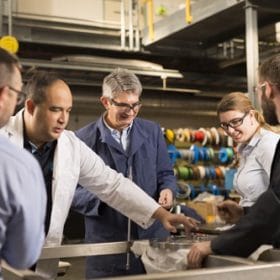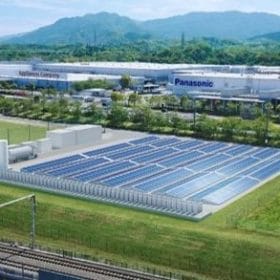Using excess heat from PV modules for lithium-extraction process
Canada-based Enertopia filed provisional patents for technology that it said could boost PV system output by 10% or more and reduce panel heat stress.
Holographic light collector to improve solar panel yield
In the proposed system, the optical element is placed symmetrically at the centre of the solar panel in order to increase the length of the effective light collection region. Each hologram is claimed to be able to separate the colors of sunlight and direct them to the solar cells within the solar panel.
Mission Possible: CSIRO launches $68 million Hydrogen Industry Mission
Australia’s national science agency, the CSIRO, has launched a collaborative “Team Australia” style mission bringing together actors from all aspects of hydrogen development and production toward the goal of driving costs below $2/kg and driving Australia toward hydrogen superpower status by 2030.
Panasonic combines hydrogen fuel cell generators with PV and storage
The pilot project is combining hydrogen fuel cell generators with a combined capacity of 500 kW with a 570 kW solar array and 1.1 MWh of lithium-ion batteries. It is planned to come online in the spring of 2022.
Water-free, portable cleaning bot for rooftop solar
India’s Aegeus Technologies has developed an autonomous, water-free cleaning bot for rooftop solar installations. The bot weighs 5 kg (with battery) and can be operated remotely through a web-based app. It uses an air wash technology to clean the panels, ensuring no need for water or any harmful chemicals.
Tool offers insight into how solar and wind impact wholesale electric prices
U.S. Department of Energy’s Berkeley Lab has devised a tool to allow users to compare pricing trends across locations, regions, and timeframes, down to the nodal level.
$11 million ARENA/Alcoa project to demonstrate efficient green alumina processing
ARENA and green-thumb Angus Taylor have launched a project to demonstrate that renewable energy can be cost competitive compared to fossil-fuel use in the processing of alumina — providing an incentive for one of Australia’s biggest industries to adopt this technology and offer low-carbon alumina to the world market.
The winning ways of the Australian Technologies Competition
Got a startup that’s contributing to the energy transition, to advancing development of “smart” cities, to decarbonisation of agriculture or mines? The ATC has a track record for scaling up promising tech and has just extended its entry deadline to June 7. Opportunity knocks.
Discovered: Sandwich structure of quasi-2D perovskite film nourishes next-gen solar development
Even as solar researchers strive to squeeze every drop of efficiency from the industry-ruling silicon solar-cell technology, scientists are constantly questing for the next, cheaper, more efficient way of harvesting the sun’s energy to power human endeavours. The appetite for accelerating 2D perovskite solar cell development has just been piqued!
Sunday read: All that glitters is HJT
The devil is in the details, as they say, and when it comes to the next generation of mass-produced, high-efficiency PV cells, silver costs may be devilishly hard to reduce. Making things worse, prices for the precious metal are now heading in the wrong direction.















